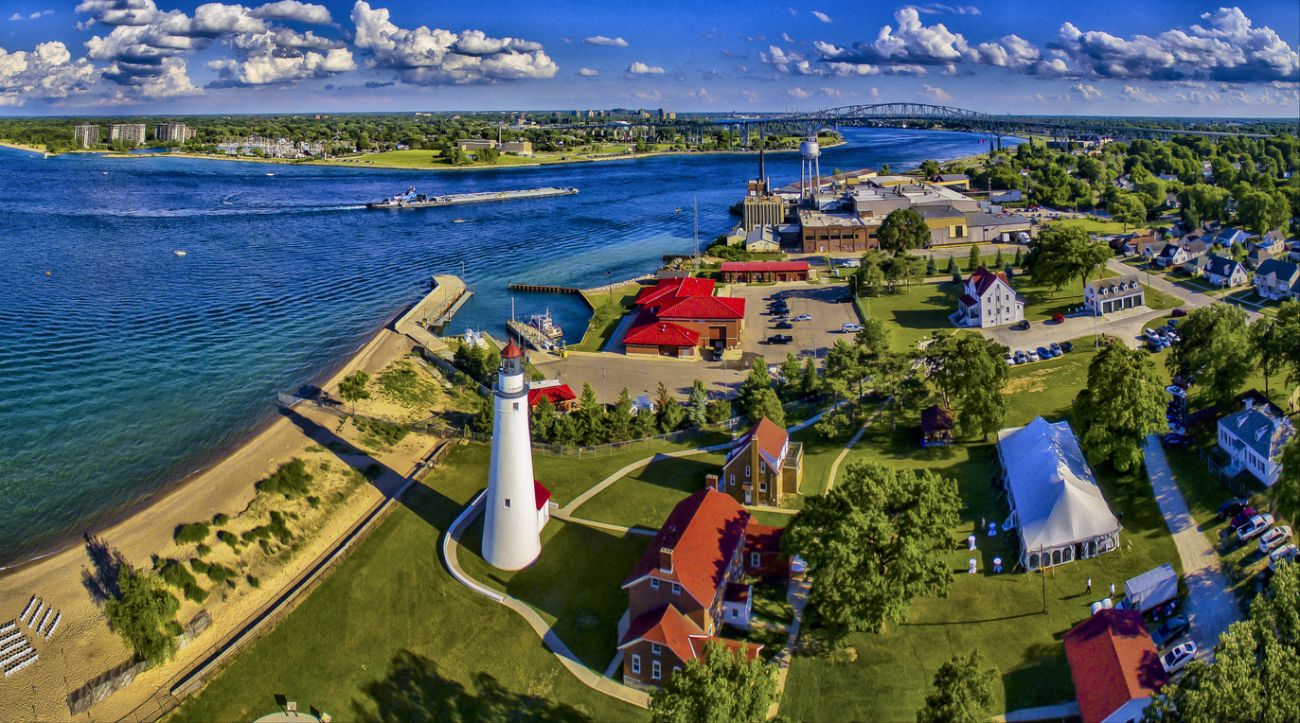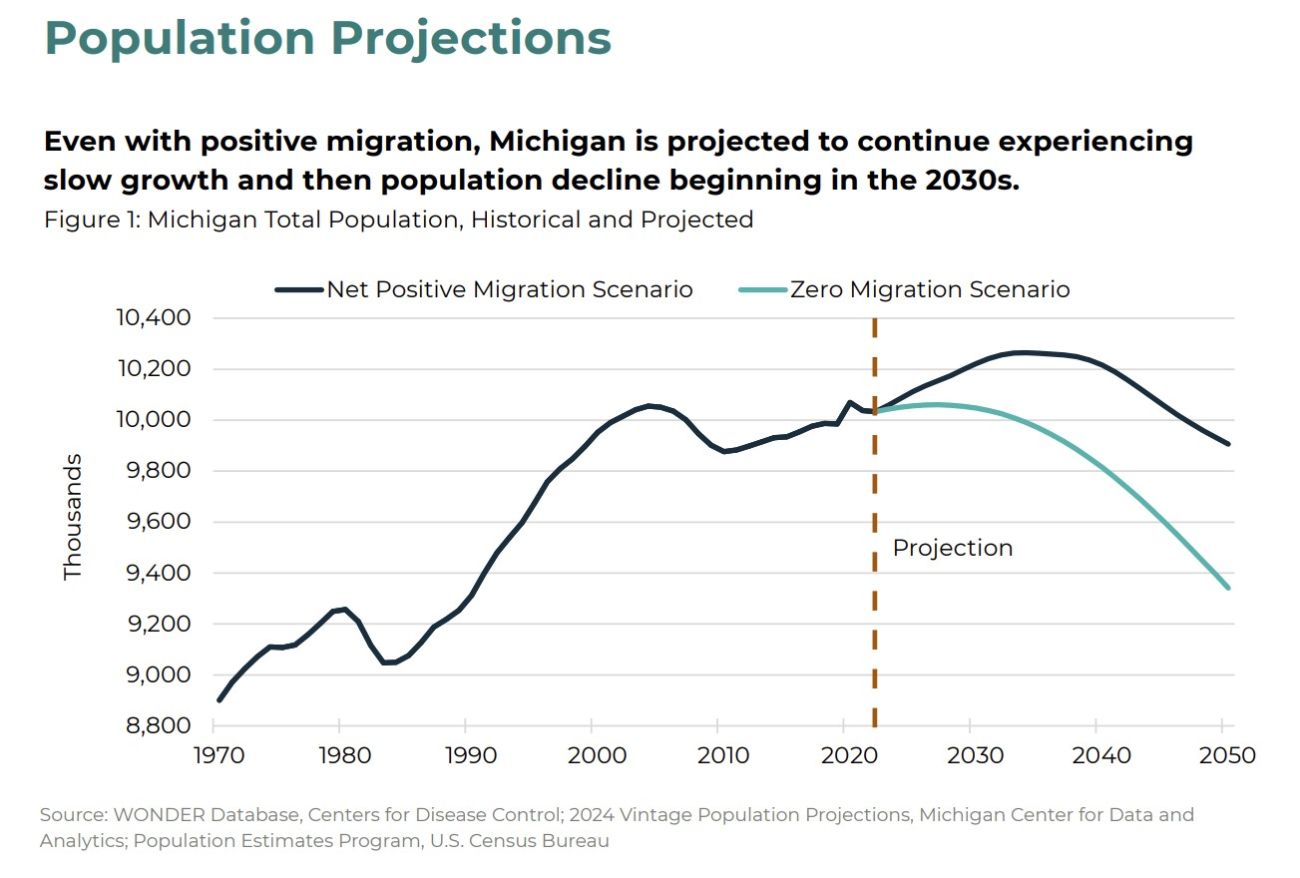Michigan population may plummet by 700K in 26 years, report warns

- Michigan population could fall by nearly 700,000 by 2050, state demographers predict
- Even with an influx of residents from abroad and other states, the losses will still hit 128,000
- Michigan will hit a demographic cliff — more deaths than births — a few years earlier than nation
Michigan’s demographic woes could get even worse in the next few decades, as a new report projects the state population could decline by nearly 700,000 residents by 2050.
The report from the state’s demographers, the Michigan Center for Data and Analytics, forecasts a big population drop unless long-term trends turn around and more people move to Michigan than leave it.
And even if they do, the state’s population — now 10.1 million — will still likely fall by 128,000 in population as deaths are projected to outnumber births by some 25,000 per year within a decade.

The latest report comes amid growing consternation among political and economic leaders about stiff headwinds facing Michigan and other northern states.
Related:
- Michigan population panel files recommendations. Now the hard work begins
- Michigan continues to lose residents, amid Whitmer push to grow population
- Michigan loses 14K people a year to other states. It could be worse (and has)
- Can Michigan defuse its population time bomb? See how far we fall short
The report’s language is blunt, predicting “sustained and steepening” loss from a generational shift, as residents age and fewer women are of childbearing years.
“We’re certainly not alone and the nation is going to follow,” said Alan Leach, a demographic analyst for the center. Estimates suggest the nation will have more deaths than births beginning in 2038, he said.
“We’re just going to get there sooner.”
A projected loss of 700,000 residents would be a decline of 7%, reducing Michigan’s population to a level not seen since 1990, perhaps knocking it from its perch as the nation’s 10th largest state for population.
For perspective, Michigan lost 54,000 residents from 2000 to 2010, the only decade in history the state’s population declined.
The projected loss in the next 26 years would be nearly 13 times as much.
“Substantial population growth from natural increase is unlikely in the foreseeable future,” the report concluded.
“However, if Michigan maintains net positive migration near the levels in the 1990s, the state potentially has another five to 10 years until natural decrease is so severe that net positive migration is unlikely to offset it.”
The forecast is the most recent since 2019, one year before the pandemic, and it comes as Gov. Gretchen Whitmer and other state officials are getting serious about Michigan’s vexing population problems.
Michigan ranks 49th among states nationwide in population growth since 1990, ahead of only West Virginia, exacerbating worker shortages, impacting housing costs, infrastructure and quality of life.
Leach and colleague Jaclyn Butler, the state’s official demographer, aren’t alone in their predictions.
A 2023 report by the Citizens Research Council of Michigan for Altarum, a Michigan-based nonprofit focusing on health, reached similar conclusions and the Business Leaders for Michigan warned that Michigan is a “below-average state” that must address population as part of a strategy to protect the state’s economy.
"Gov. Whitmer is focused on making Michigan a state where everyone can thrive. That's why she's working to attract good-paying jobs, lower costs by building more affordable housing, protect and expand fundamental rights, and so much more,” said Whitmer spokesperson Stacey LaRouche in a statement to Bridge Michigan.
In recent years, Whitmer has created the Growing Michigan Together Council to brainstorm ideas to reverse trends and appointed a chief growth officer.
The most recent population report notes that aging demographics will impact much of the country.
Experts and Census data indicate some areas will better sustain the changes, including the Sun Belt, Mountain West and West Coast, which continue to attract residents from other states.
Michigan, however, has lost residents to those states while its flow of international migrants has waned. And now it has more funerals than baby showers.
“Michigan is now going into a long term situation where we’re going to have more deaths than births,” Leach said. “Our growth will be entirely dependent in the near future on positive migration.”
On that front, the prognosis is not good. Michigan continually has one of the highest out-migration rates as tracked by both the Census, the IRS and residential shipping companies.
The COVID-19 pandemic accelerated the time when deaths would exceed births in Michigan, hitting that milestone in 2020.
But with the state’s birth rate lower than the nation’s and in a state where the over 65 population is set to grow 30% by 2050, deaths will routinely exceed births, Leach and Butler predict.
That was the trend in 73 of the state’s 83 counties in 2023, according to the most recent Census estimates, which had the state population increasing by just 4,000 residents.
That gap between deaths and births is only expected to grow, according to the report.
From the 1940s to early 1960s, Michigan’s total fertility rate was higher than the nation, according to the report. But since the mid-1970s it has consistently been below that threshold and not reached “replacement” level, where each woman has two or more children.
Since the U.S. last hit that rate in 2007, it has fallen to 1.67 average children per woman, yet still above Michigan’s average of 1.57.
The population wildcard is migration, once a boon to Michigan, whose population nearly doubled between 1910 (2.8 million) and 1940 (5.3 million) as millions flocked to the state for work.
Now, those arriving from abroad are not offsetting the state’s losses to the rest of the nation.
Between 2020 and 2023, the state had lost a net of 5,268 to other states while gaining 3,900 from abroad, for an overall net migration loss of nearly 1,400.
See what new members are saying about why they donated to Bridge Michigan:
- “In order for this information to be accurate and unbiased it must be underwritten by its readers, not by special interests.” - Larry S.
- “Not many other media sources report on the topics Bridge does.” - Susan B.
- “Your journalism is outstanding and rare these days.” - Mark S.
If you want to ensure the future of nonpartisan, nonprofit Michigan journalism, please become a member today. You, too, will be asked why you donated and maybe we'll feature your quote next time!




